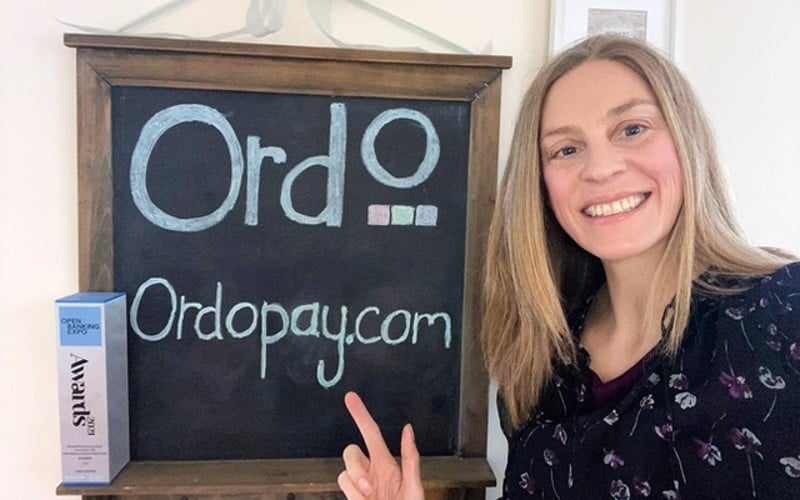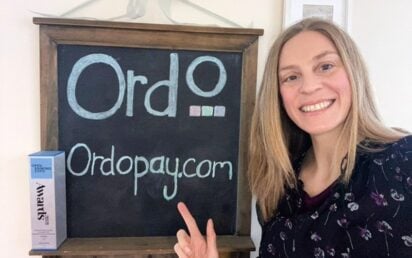Many founders have spent their career within the machinery of business.
Perhaps they occupied executive positions at large tech companies, or worked in capital markets, before identifying a niche and striking out into startup land.
Fliss Berridge, co-founder of FinTech Ordo, is a former member of the management team at Faster Payments, the system used by banks to process online and mobile payments.
However she is also among a minority of former professional musicians at the forefront of technology, having begun her career as a freelance classical trombonist. “I played in orchestras for many years,” she tells TechBlast.
“There’s nothing like sitting in an 80-piece orchestra and playing – but it’s not very secure, it’s not very long-term.
“I thought to myself ‘this is fine when you’re 25, but it’s not going to be fine when you’re 65’. But if I was going to give up playing music for a living, it had to be for something worthwhile.”
Law and order
Berridge retrained as a lawyer and would eventually become head of legal, regulatory and corporate governance at the Faster Payments Scheme. Prior to that, she held the same position at mobile payments firm Paym.
Before Faster Payments was absorbed into Pay.UK, members of the management team – including Berridge and chief executive Craig Tillotson – decided to found open banking payments-as-a-service platform Ordo.
The London firm, third on our sister publication BusinessCloud’s recent FinTech 50 ranking, enables businesses to collect payments for single and recurring bills via paper bills, email, text or any other messaging platform. It does this by providing a QR code or secure tokenised link which takes people into their bank account, where the payment request is waiting – all they have to do is click a button to authorise it.
“We know ‘geek levels’ about payments, and we’ve built a system that’s easy for businesses to use. We’re a business-first company and that’s the differentiator with our competitors,” says Berridge.
“A lot of the other players in the market are quite tech- and API-driven so if a business uses one of those services, they’ll have to do a lot of tech builds themselves.
“Our target market is corporates – medium-to-large-sized businesses. Our strategy is to go through channel partners, the integrators, to reach the most people possible.”
For example, Pay360 by Capita is an IT system and platform used by most councils in the UK. “They’ve integrated Ordo into their platform. A council using it can plug-and-play our system and can start saving from day one,” says Berridge.
Pivot
Founded in 2018, Ordo’s technology direction has not altered significantly. However, Berridge reveals candidly, its market approach underwent a large-scale pivot.
“We started out by marketing to SMEs: we thought our target audience needed to be those who feel the pain, the people on the coalface trying to collect payments but with the seniority and decision-making power in their company to move to open banking,” she says.
“However we launched in COVID – and SMEs, in particular, were just trying to survive and keep their business afloat. It meant that they didn’t have headspace or capacity for considering a new payment method.
“It was frustrating because we knew we could make a difference to them.”
The decision was made to focus on corporates. “They don’t move quickly, but once you do get them, they’ve got volume to back up the usage of your service – that was our pivot,” she explains.
“Open banking is a new national technology. It needs endorsement from corporates to start using it.”
Can Housekeep go from ‘£5k & one cleaner’ to £100m business?
Relationships are key
Asked for a key piece of advice for a growing company, Berridge says relationships are key.
“And I mean a broad cross-section of relationships,” she qualifies. “For example, our direct regulator is the Financial Conduct Authority – they’ve authorised us as people, our system and our security – but because of our background, we’re plugged into the other regulators.
“We can [therefore] influence policy and decision-making to enable a thriving market for FinTechs rather than the incumbent banks. Having those relationships keeps conversations going.
“You can track that across to investment: keeping investors up to date but also looking forward and putting out feelers and conversations before you might need to next raise investment. Also, of course, communicate with your partners and people that might help you in the market: customers, integrators.
“You never know what might lead to something.”


